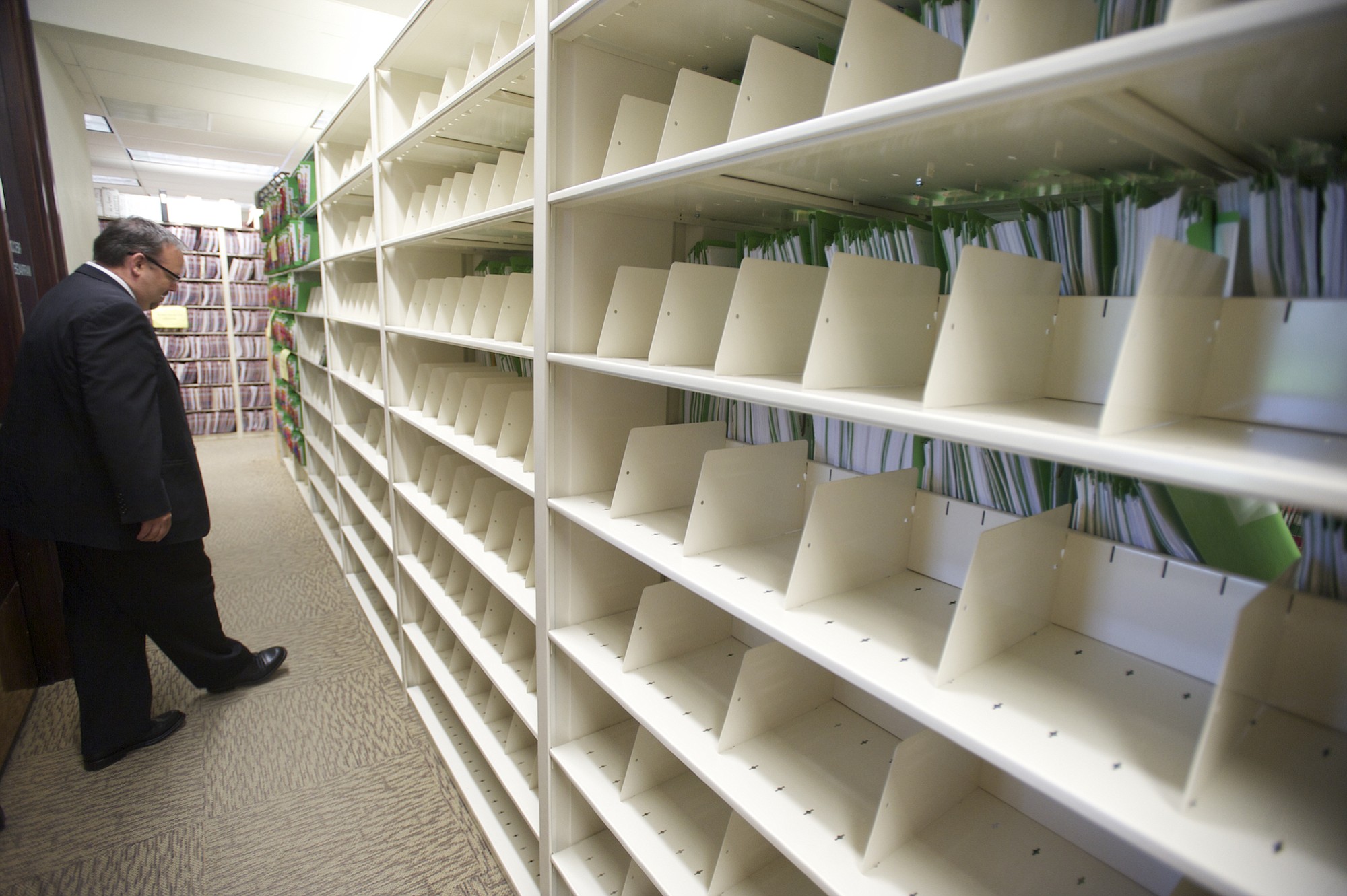Empty shelves and empty cardboard files line the aisles of the family law section of the Clark County Clerk’s Office. The barren aisles are perhaps the most visible sign of the office’s shift toward creating a paperless courthouse.
County Clerk Scott Weber prefers to call it a paper-on-demand courthouse.
“Our priority has been technology and the flow of information,” Weber said.
Since he took office, Weber said he’s envisioned a courthouse where documents are immediately scanned and streamlined into the courthouse’s digital content management system, LibertyNET, and where paper is a dusty memory of bygone days.
Much of his vision already has materialized, and the cost of the upgrades has been about $12,000, he said. Many of the changes have been paid for through increased participation in the courthouse document management system, primarily by attorneys, who must buy a subscription.
Paperless courtrooms
Documents in family law and civil cases are now scanned in and stored digitally. No more paper files. Criminal cases still have paper files, but Weber said his goal is to make those digital, as well, in the future.
Most of the courthouse’s judges now review their cases on computers, rather than receiving a paper file from the clerk’s office.
“If you think of people who have been using paper for the majority of their lives, then go paperless, they have done an excellent job with this transition,” Weber said.
E-filing
Some attorneys also are filing paperwork electronically from the comfort of their personal offices. District Court, where misdemeanor and small claims are filed, began mandatory electronic filing for attorneys in September.
“Everything we used to file at the courthouse, we now can send from our office,” said attorney Chad Sleight of Vancouver’s Wheeler, Montgomery, Sleight & Boyd.
There are a few exceptions, including litigants who don’t have an attorney. There is no mechanism for the public to file court documents online, but creating one is a goal for the future, Weber said. The public still has to file court documents at the courthouse.
Superior Court, where felony cases and other civil lawsuits are filed, began offering electronic filing as an option to attorneys in May, Weber said.
“It’s convenient,” said criminal defense attorney Matthew Hoff. “It saves me time from having to schlep to the courthouse.”
The transition, however, has not been without technical difficulties.
“There was one time when I didn’t get a confirmation email, so I ended up faxing the documents,” Hoff said.
Weber said in order to improve the e-filing service and increase awareness about it, he has visited more than 100 law firms in Vancouver and 10 firms in Portland to hear lawyers’ feedback.
Access to court records
Some attorneys also have paid subscriptions to the courthouse’s digital document management system, LibertyNET, where they can look up court records from their offices. LibertyNET also is available to the public in the lobby of the clerk’s office on the first floor of the courthouse, 1200 Franklin St. In the past several months, Weber expanded the number of public computer stations in the lobby from two to four.
“If you can see it in LibertyNET, the judge can see it on the bench,” Weber said.
In order to make the subscription more attractive, Weber has increased the speed at which documents are available in the system. It used to take two to three days for new court records to appear on LibertyNET; now, it takes 20 minutes to two hours, Weber said.
The efficiency came from the way his office processes court records. About a year ago, Weber said, he started asking clerks to scan documents in before entering information into computers, a reversal of procedure. He also instituted batch scanning. Clerks put a whole stack of documents into a copier instead of scanning each document individually. Cases are separated by a blank page. With the new method, clerks are able to scan in 8,000 pages per day, compared with 2,000 per day previously.
“That’s what gives you the immediate access to the information online,” Weber said. “When the attorneys come back from court, they’re just going back to their office and printing them or emailing them Liberty.”
Sleight, who has a LibertyNET subscription, said he looks up cases from his office instead of going to the courthouse. He said he’s noticed an increase in the efficiency in getting documents into the system.
“The paperwork in Superior Court is just there (on LibertyNET), and it’s there fast,” Sleight said. “It’s almost scary how much you can find. I know Scott’s big focus has been to make things more efficient.”
LibertyNET, however, also has its limitations. The system only operates in Internet Explorer and doesn’t work on Apple computers.
Hoff, who has an Apple computer, said he would like to have LibertyNET, but isn’t going to buy another computer solely for that purpose.



